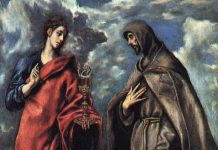A blessed solemnity of Christ the King to all our readers! A rather recent feast, as Church history goes, first promulgated by Pope Pius XI in the wake of the ‘war to end all wars’, in his encyclical of December 11, 1925, Quas Primas, in the sixteenth centenary of the Council of Nicaea, which, as the Holy Father states, defined and proposed for Catholic belief the dogma of the Consubstantiality of the Onlybegotten with the Father, and added to the Creed the words “of whose kingdom there shall be no end,” thereby affirming the kingly dignity of Christ.
And as the Pope declares emphatically a few lines earlier, in words that seem to ring just as true today, as then:
And We remember saying that these manifold evils in the world were due to the fact that the majority of men had thrust Jesus Christ and his holy law out of their lives; that these had no place either in private affairs or in politics: and we said further, that as long as individuals and states refused to submit to the rule of our Savior, there would be no really hopeful prospect of a lasting peace among nations.
The whole letter is well worth a perusal.
This feast, first placed on the last Sunday of October – when it is still celebrated in the usus antiquior – in part as an bold liturgical answer to the Lutheran ‘Reformation Sunday’ (the Protestants have a different idea of Christ’s kingdom) – the feast was moved to the more eschatologically significant last Sunday of the liturgical year, where we prepare more intensely not only for the birth of the Saviour, but His return at the end of time, when, to return to the Creed, ‘He will come again to judge the living and the dead’.










